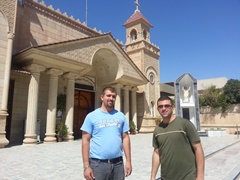|
Young Christians in Iraq - To stay or to go? As violence, insecurity and discrimination continue, two brothers in Iraq struggle with the decision to stay or to leave. Kirkuk: it's a microcosm of Iraq. The multi-ethnic city in the north of this battered country is the home of Kurds, Arabs, Turkmens and Christians. Different religions, languages and ethnic groups call this home. Their co-existence is accordingly riven with conflict, especially since the province of Kirkuk has significant oil deposits.
The jihadists of ISIS are hardly 12 miles away and they also have the town in their sights. Many fear that a fighting will develop some time. But how does a Christian live in such a situation? "My tank is always full. If the situation escalates, I'll grab my wife and my child and flee. At the present time there is a gas shortage here because a large refinery is being fought over. To save gas, I am already going to work by bike. I don't want to take any risks." Karam is 23 years old. This young father is a Chaldean Catholic like about 5000 other Kirkuk inhabitants. His wife is soon expecting their second child. "I never thought I would ever think of leaving. But now I'm not only responsible for myself." Mohand nods. The 26-year-old is Karam's older brother. The seminarian is studying theology and will be ordained as a priest in a few years. "Another three years, all being well," he estimates. "I understand my brother. He's got a wife and children. We talk a lot about it in the seminary. The emigration of our faithful is really our greatest challenge." There are no easy solutions, he thinks. "People fear for their children. If I tell a young family: 'Stay, don't go,' they say: 'What if someone comes and wants to kill us? Who will guarantee our safety?'" This dilemma of having to trade their home for security is plaguing many Iraqi Christians nowadays. "It's mainly the well-educated, prosperous families who are considering emigrating. They will easily be able to establish themselves in the west as engineers or doctors. Those who stay behind are the ones who can't afford to go," Mohand says. The young man has wanted to become a priest since he was 14. "I see the priest as a burning candle of faith and hope. If it goes out then faith will extinguish as well." In Mohand's view, the Christians must be educated to understand their faith better. "It's often only a faith of habit. But it must be a faith of conscious conviction," he says. "We Christians are supposed to be the light of the world and the salt of the earth. Without salt, food does not taste at all. That is the Christian calling here in Iraq as well." Karam agrees with his brother. "I love my homeland and my faith. But even before ISIS advanced it was not easy to be a Christian here." The young man studied agriculture. "I was second in my year but I still can't find a job." He is now working as a driver for the Bishop of Kirkuk. "The Church helps us as well as it can. But apart from that all the good jobs go to Muslims. It's difficult for Christians to find employment anywhere.” “For instance, I applied to Northoil, a large oil company here in Kirkuk. But the Shiites are in charge here and they employ their own people. We Christians don't stand a chance.” “The only jobs for Christians are in the army and the police. But that's only because it's dangerous and nobody wants to do it." At the same time, Karam describes the relations with Muslims as not bad on the whole. "I never had any problems with them. Many Muslims respect us Christians because we're not aggressive and violent." But the boundaries between the religions are still clear, he believes. "Mostly it's restricted to a few friendly words with neighbors or in shops. My only real friends are Christians. We live in a closed community." The Church is now endeavoring to extend the hand of friendship to Muslim fellow citizens. About 500 mostly Muslim families are at present being supported with food by the Diocese of Kirkuk. Only twenty families are Christian. Young people in the parish work with nuns to put together packages for the refugees who have sought safety from ISIS in Kirkuk. Beans, sugar, flour and rice are wrapped in yellow bags. "Our faith teaches us not to discriminate. The love of God is for all people, whether Muslims or Christians," Mohand says. "That's how I see our role here. I don't want to leave. Jesus himself also planted the seed of our faith here in the Middle East. And so I belong here." In the past five years, Aid to the Church in Need has given over $3.2 million in aid in Iraq.
With picture of the brothers Karam and Mohand in front of the Chaldean Cathedral of the Sacred Heart in Kirkuk, Iraq (© ACN) |
|
|

 For years the town has been convulsed by attacks. Christians have also fallen victim to such attacks. After the advance of ISIS in June the Kurds occupied the town and incorporated it into their area of control.
For years the town has been convulsed by attacks. Christians have also fallen victim to such attacks. After the advance of ISIS in June the Kurds occupied the town and incorporated it into their area of control.